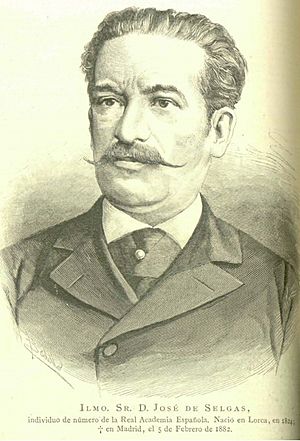José Selgas facts for kids
Quick facts for kids
The Most Excellent
José Selgas
|
|
|---|---|
 |
|
| Born |
José Selgas y Carrasco
27 November 1822 Lorca, Spain
|
| Died | 5 February 1882 (aged 59) Madrid, Spain
|
| Seat b of the Real Academia Española | |
| In office 1 March 1874 – 5 February 1882 |
|
| Preceded by | Joaquín Francisco Pacheco |
| Succeeded by | Víctor Balaguer i Cirera |
José Selgas y Carrasco was a Spanish writer born in Lorca, Spain, on November 27, 1822. He passed away in Madrid on February 5, 1882. He was known for his poems, stories, and newspaper articles.
Contents
About José Selgas's Life
José Selgas grew up in Lorca, Spain. He started his education at the Seminary of San Fulgencio. His family faced money problems, so he had to stop his studies early. He needed to help support his family.
Later, José moved to Madrid. There, he worked in small government jobs. He also started working as a journalist, writing for newspapers. He wrote articles for a newspaper called El Padre Cobos and other publications.
He was a strong supporter of conservative ideas. He often wrote articles that disagreed with liberal views. He also worked as a secretary for Martinez Campos, who was a Prime Minister at the time. The important Spanish Academy chose him as one of its members.
José Selgas's Writings
José Selgas is considered a minor writer, meaning he is not one of the most famous. His best works are his poems and short stories. His longer novels are not as well-known.
His Poetry
Much of his poetry has a gentle, sad feeling. You can find his best poems in two collections published in 1850:
- La Primavera (meaning "Spring")
- El Estio (meaning "Summer")
After he died, another book of his poems came out. It was called Flores y Espinas (meaning "Flowers and Thorns").
His Stories and Novels
José Selgas was most successful when he wrote short stories that were sentimental. This means they focused on feelings and emotions. He was less popular when his stories became pessimistic, showing a negative view of life. Sometimes, his sentimental or pessimistic feelings could even seem a bit unhealthy.
Some of his longer novels include:
- Dos Rivales (meaning "Two Rivals")
- Una Madre (meaning "A Mother")
These longer books are often described as being a bit boring.
His Journalism
Many of his newspaper articles were collected into books. Some of these collections are:
- Hojas sueltas (meaning "Loose Pages")
- Estudios sociales (meaning "Social Studies")
These articles show his very conservative political views.
See also
 In Spanish: José Selgas para niños
In Spanish: José Selgas para niños
 | Tommie Smith |
 | Simone Manuel |
 | Shani Davis |
 | Simone Biles |
 | Alice Coachman |

